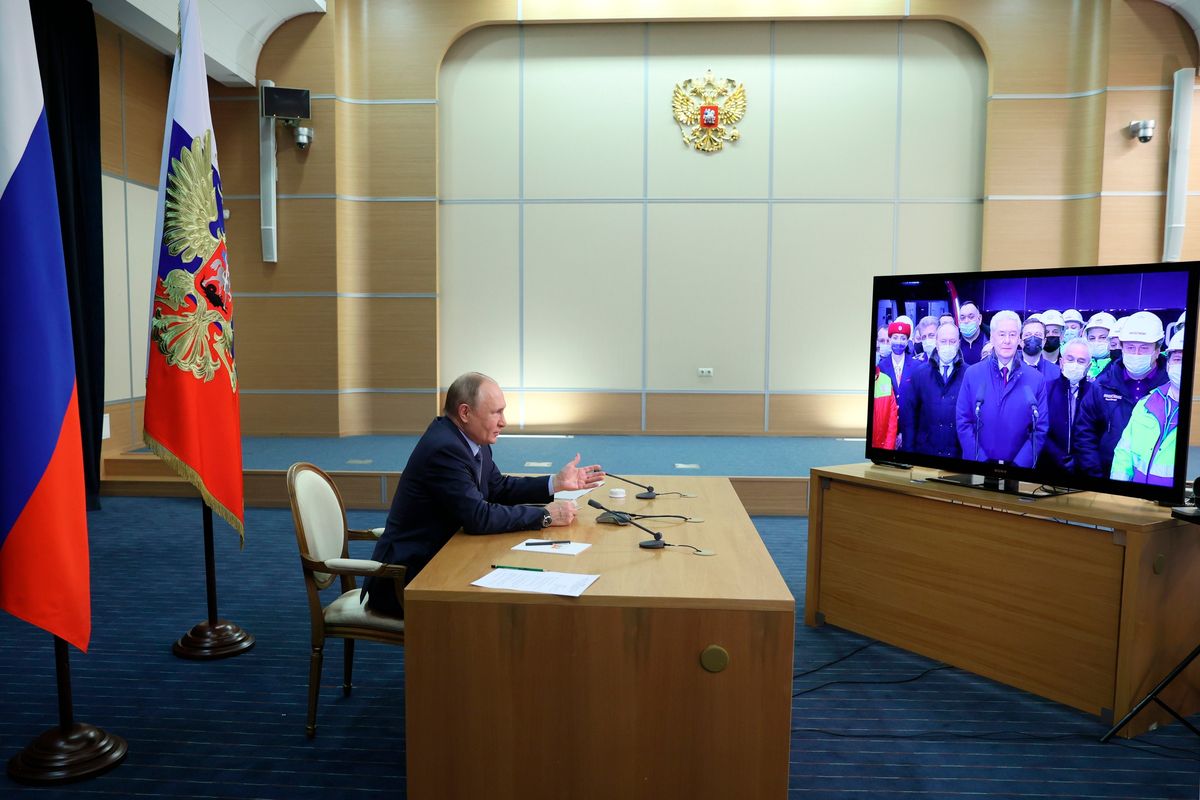Biden-Putin square off as tension grows on Ukraine border

President Joe Biden warned Russian President Vladimir Putin during a video conference Tuesday that invading Ukraine would result in stiff economic sanctions from the U.S. and several European allies.
The virtual meeting, the second time the two leaders have held direct talks since their June summit in Geneva, arose after Putin mobilized some 100,000 Russian forces on the country’s border with Ukraine, sparking new fears about an invasion.
“President Biden voiced the deep concerns of the United States and our European Allies about Russia’s escalation of forces surrounding Ukraine and made clear that the U.S. and our Allies would respond with strong economic and other measures in the event of military escalation,” according to a readout of the call released by the White House after the conference.
During their two-hour meeting, Biden reiterated his support for Ukraine’s sovereignty and called for de-escalation and a return to diplomacy. “The two presidents tasked their teams to follow up, and the U.S. will do so in close coordination with allies and partners,” the statement said.
The two world leaders discussed U.S. and Russian long-term work on arms control, ransomware and joint efforts on regional issues like Iran.
Putin has sought assurances NATO won’t make Ukraine a member of the alliance, which has 30 members, including the U.S. Membership would essentially guarantee the former Soviet republic’s military defense.
“President Biden was direct and straightforward with President Putin as he always is,” said Jake Sullivan, Biden’s national security adviser, following the meeting. “There was no finger wagging but the president was crystal clear about where the administration stands.”
“We still do not believe that President Putin has made a decision,” about whether or not to launch an invasion, Sullivan said.
While Biden has rejected any of Putin’s “red lines” and expressed support for Ukraine’s territorial sovereignty, he has shown little interest in fully backing its potential NATO membership. The president, even as he has sought to strengthen democratic alliances, has appeared wary of the U.S. taking on additional global defense responsibilities as he focuses on shoring up the American economy and reorienting alliances around the containment of China.
But he is hoping to dissuade Putin from escalating the simmering military conflict along the Russia-Ukraine border.
“This is one of the last, best chances to affect Kremlin thinking,” said Steven Pifer, a former U.S. ambassador to Ukraine who is now the William Perry Fellow at Stanford University. Putin’s response in the coming weeks and months, he continued, will make clear whether Biden made any inroads.
“The big questions to be answered are: Do we see the Russian military deployments changing?” Pifer said. “And how does the Kremlin portray the call, and do the Russians tone down the really over-the-top rhetoric they’ve been issuing about Ukraine in recent days?”
Ahead of the discussion with Putin, Biden conferred with top European allies Monday about the far-reaching economic sanctions any invasion would trigger.
“The leaders underscored their support for Ukraine’s sovereignty and territorial integrity,” the White House said in a statement summarizing the call. “They agreed that their teams will stay in close touch, including in consultation with NATO allies and EU partners, on a coordinated and comprehensive approach.”
To that end, Biden planned to debrief with the top four European leaders on another call Tuesday evening to update allies on the nature of his talks with Putin, the White House said.
Ukraine won independence after the fall of the Soviet Union in 1991. It has since sought to strengthen ties with Europe. After the ouster of Russian-friendly Ukrainian President Viktor Yanukovych, Putin seized the Black Sea peninsula of Crimea in 2014, and tensions have remained high.
Sullivan suggested the economic sanctions could be more far-reaching than those imposed after Russia’s 2014 annexation of Crimea, although he declined to go into specifics publicly. “Things we did not do in 2014 we are prepared to do now,” he said.
President Donald Trump softened America’s posture toward Putin, who U.S. intelligence officials say conducted a misinformation campaign to help Trump in the 2016 election. In 2019, Trump pressured Ukraine’s President Volodymyr Zelenskyy to announce a corruption investigation of Biden’s son Hunter’s business dealings in Kyev in a failed attempt to smear the eventual Democratic nominee. That effort led to Trump’s first impeachment by the House in 2019.
Since taking office, Biden has sought to return U.S. foreign policy to its more traditional position of skepticism toward Russia and support for the fledgling democracies that emerged after the Soviet Union was dissolved. He welcomed Zelenskyy at the White House in August and has reaffirmed the importance of NATO while still hedging on the question of Ukraine’s potential membership.